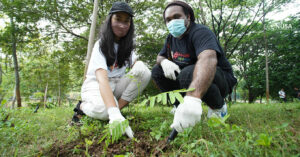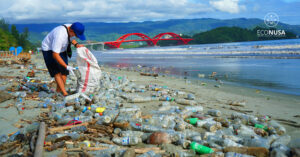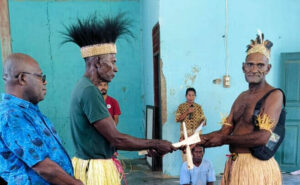
Tri Komando Rakyat (Trikora/Three People’s Commands) is deemed a historical memento to Indonesia during its struggle for Irian Barat from the Dutch colonials in 1961. But, only a few knows that Gane Dalam is a village on the southern tip of Halmahera Island in which laid the Indonesian military base at the time. The village is the silent eyewitness of the country’s battle to take Maluku Island and Tanah Papua back to Indonesia sovereignty.
On 24 October 2020, EcoNusa Maluku Expedition team in collaboration with WALHI North Maluku and PakaTiva met the community of Gane Dalam as part of the expeditions. Arriving at the dock, the team heard musical instrument. The team was hailed by Gane Dalam women who danced Ronggenglala.
“This is the way we party,” said Calo, a youngster of Gane Dalam and member of WALHI North Maluku. Women dancers and other villagers depicted their exultant expression.
It goes beyond imagination when seven years ago their jubilant faces suffered from misery and tears on their struggles to fight back their land from a multinational company, PT. Korindo. Prior to the existence of the company in 2012, the 11,003.9-hectare plots of land in Gane Dalam was managed by logging company, PT. Gelora Mandiri Membangun (PT GMM). The land clearance activity was based on the Forestry Ministry Decree SK.22/Menhut-II/2009 on 29 January 2009 on the release of some of the convertible production forest. In 2013, in the mid of the rights of use when timbers in Gane Dalam were totally cut off, PT GMM was acquired by its holding, PT. Korindo, and converted it into palm oil plantation.
At the time, Gane Dalam community strongly rebuffed the scheme given the fact that many of their lands are under the concessions of PT. Korindo without their consent. Their lands were displaced and cleared using heavy machines.
Read also: Travel Notes, Gani Country’s Forest Have Been “Shaved”
Mama Yani, 70, a native-born woman of Gane Dalam, was the one whose property was forcefully grabbed by the company. Mama Yani even let herself voluntarily sleep under the heavy machine to defend her land as the only hope for her family survival.
“My children and grandchildren could go to university from farming. Now, I cannot do farming as my land has been grabbed. So, I have to support my grandchild one by one. I am so sad. That land is my only hope,” she said.
Formerly, her two-hectare land could bless her with annual crop from coconut, nutmeg and clove. Besides, there are other plants for monthly harvest such as cassava, banana and vegetables. Her annual crop could provide Mama Yani IDR 60-70 million from one crop. But the company could only give IDR 25 million as the compensation to her. Of course, the compensation is not worth with the existence of the land if it existed now.
Muhammad Konoras, another Gane Dalam villager and member of Protester Group, told the battle to fight back their land from the company confiscation in 2013. There were 13 villagers who were criminalized and imprisoned for 60 days. “The charge was that we fought against the company. We trespassed the company rights. That was the company’s reason. We had no idea. We as villagers just fought as best as we could,” Muhammad said. During the crisis, WALHI North Maluku presented and provided legal assistance and advocacy to the villagers.
The impact of palm oil plantation could make the villagers lose their land. The villagers’ coconut trees were destroyed by coconut beetles that made the crop fail. In 2020, they can harvest their coconut. Besides, pesticide from palm oil estate on the high land harmed the other community plantations such as nutmeg and clove which led to crop failure.
Processing Crops from the Last Land Together
Despite the miserable condition the community is facing, they defend their fate by processing their crops from the remaining land while safeguarding the existing natural potential. The group of women in Gane Dalam, Mo Det Hapso, processes coconut and banana into crisp and coconut cooking oil. Those products were well-packed before selling to Ternate.
The “Mo Det Hapso” is taken from Makean language, a local language mostly used in Gane Dalam. It means “let us unite”. They are in unity with the same spirit to survive for the welfare of family and village.
Social Cooperation to Preserve Mangrove Ecosystem
It is not only the women but also local young people of Gane Dalam who are in collaboration to safeguard their nature despite the small size of the remaining. Through a so-called Tanamera Community, they move to maintain soki (local language for mangrove). On 25 October 2020, EcoNusa Maluku Expedition team, Tanamera Community, and WALHI North Maluku planted 100 soki at one coastal spot in Gane Dalam.

Gane Dalam villagers have thus far made use of mangrove ecosystem for their daily life. Mangrove wood is often taken as the firewood. The leaves are for traditional medicine for the women after their delivery. Mangrove leave is boiled for herbal drink and bathing. Locals believe that it will revive the woman body so as to be stronger.

Based on field monitoring, there are at leat three kinds of mangrove on Gane Dalam coastal areas, namely soki (Rhizophora sp) and Bruguiera gymnoryza, and Soneratia sp, or traditionally called tagalolo.
Mangrove ecosystem is safeguarded by Gane Dalam youngsters. They have one common hope that mangrove will always give benefit to the community daily life and the sustainability to the region.
Carmelita MamontoCoordinator of SEI Program and Liaison Officer of Molucca Region
Editor: Leo Wahyudi







